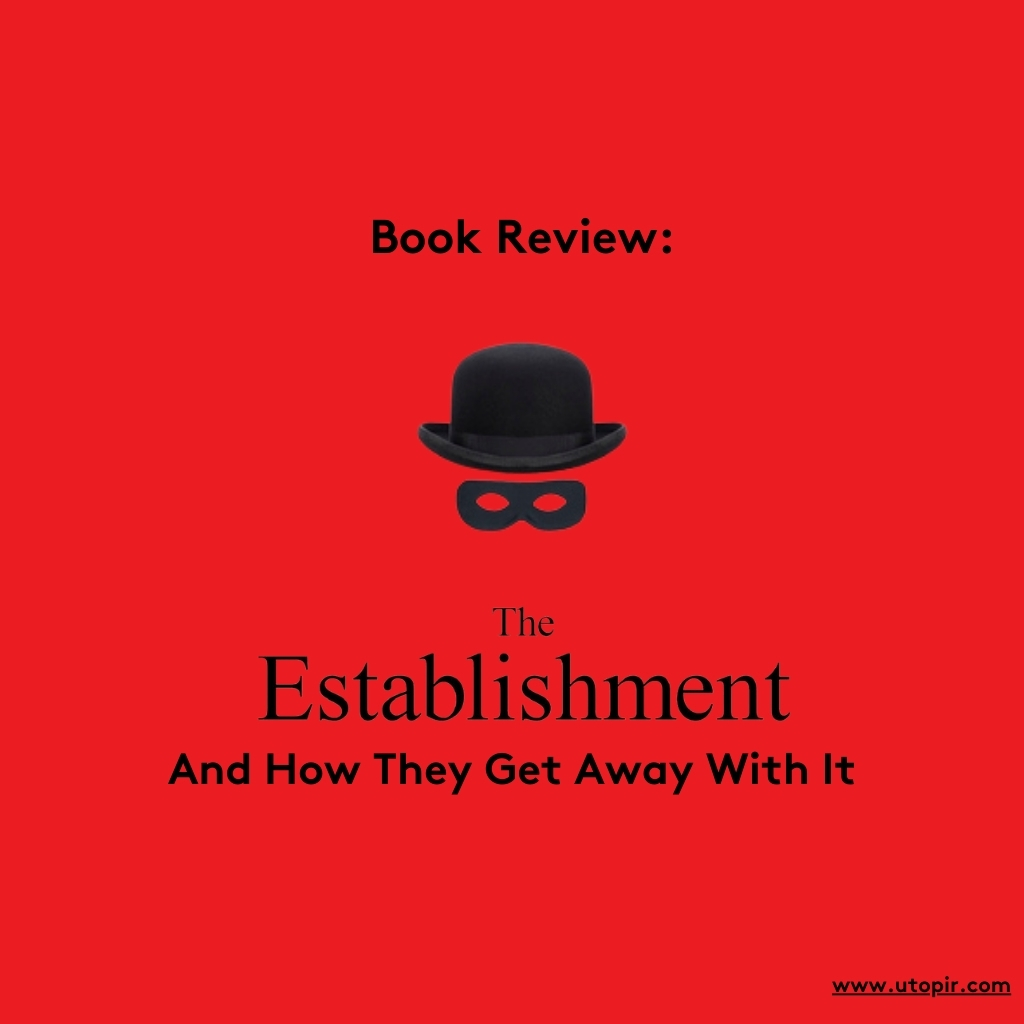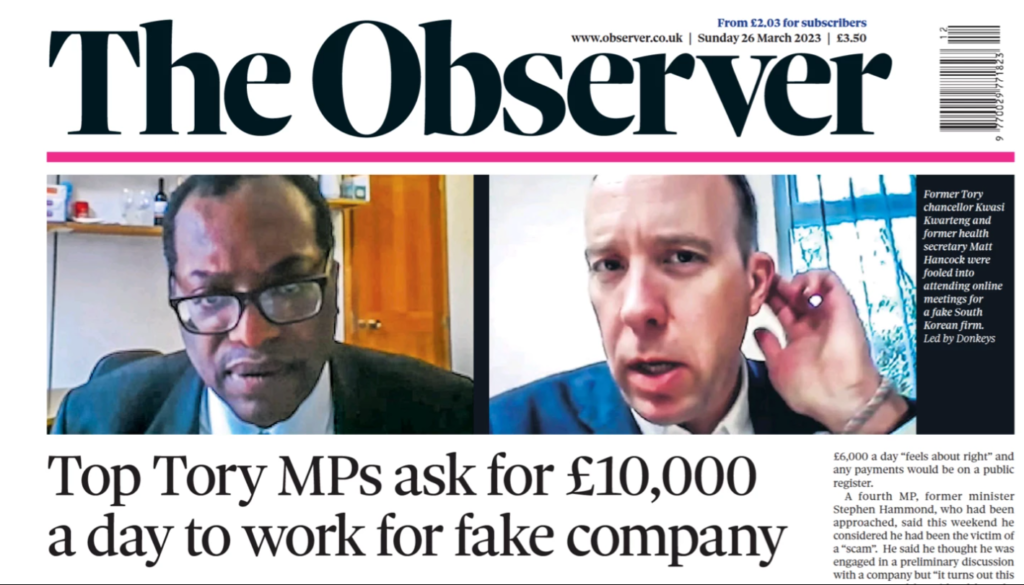
“You Can Prove Anything with Facts” – Owen Jones, The Establishment
In “The Establishment,” Owen Jones argues that “you can prove anything with facts,” highlighting how information can be manipulated to support various narratives.

Why is it that nothing ever changes? We vote but nothing really changes for the better. Big, bold moves like the re-Nationalisation of Water, Energy, the Railways and other essential services are slow or non-existent.
The poor get poorer – the rich get richer.
Politicians lie, but nothing really happens to them… no prosecutions go through, they recieve no punishment despite the pain and hurt they do to “we” the people.
Yes. Corporations get “fined” for blatant environmental crimes, but compared to the damage done and the small % percentages compared to their profits – they then move on to the next crime to do it again and boost profits.
We are all working “harder and harder” and longer hours than our parents, but it feels like we are all just get squeezed for more and more.
The middle class is all but disappearing. Why?
Why does nothing change
No matter your political views, Owen Jones’ second book, “The Establishment,” answers this and will likely make you angry.
I think it will make you very angry indeed.
“The Establishment and how they getaway with it…”
It is so mind-blowing and insightful and full of distrubing facts… that it’s a must-read for everyone who dreams of a better world.
You’ll probably do everything but read the book and respond to his valid arguments.
The negative reaction to “The Establishment” often boils down to dismissing Owen Jones as young and naive. he himself notes in the book that, in the 1970s, free market proponents were dismissed in similar ways.
It’s important to remember that the current “Establishment” is relatively recent and not as invincible as it seems.
But back to anger: if you’re even slightly left of center, Jones’ book will make you angry for different reasons.
The majority of the British public, including some Tory voters, support ideas like re-nationalising the energy industry, but the government refuses to consider them.
This book will leave you feeling angry, depressed, powerless, overwhelmed, and shocked.
The aim of Owen Jones’ book, “The Establishment,” is to shine and light on and “expose” just how the British Establishment operates.
Jones examines how politicians, the media, the police, big businesses, the City, and the extremely wealthy manipulate the system to their advantage.
He highlights the revolving door between these groups, showing how politicians create laws benefiting big businesses, then these politicians leave government to join these businesses, and how financial auditors help to draft laws that they then (as “Consultants” ) are paid to advise and teach these business how to avoid tax and exploit.
While it’s natural for people to help those they know, Jones points out that this “mutual support” can be of great harm to everyone else.
The problem is worsening as politicians, already earning three times the median UK wage, now seek lucrative lifestyles with big business, and claim they are “underpaid” despite their substantial salaries.
The book is a powerful rebuttal of the mainstream narratives we are fed by the same “System”.
For instance, everyone knows that the 2007 Global Financial Crash was caused by reckless financial businesses and lack of regulation, with governments unpicking regulations due to their ties to big business, which funds political parties to get what they want. Despite this, within the next 7 seven years, this narrative has been dismissed in favor of blaming the public sector.
This obscures the truth: financial markets were reckless, and British taxpayers ended up paying them trillions of pounds.
The ongoing privatisation, particularly the dismantling of the NHS by the previous coalition government, continues this trend, allowing businesses to profit while the taxpayers bear the risk.

It repeatedly shows how the government, business, and media unite to crush any challenges to their narrative.
This is seen in how they led us into the Iraq War and how they fiercely opposed the YES vote for Scottish independence, using bullying and misinformation.
Jones draws parallels to the end of “Animal Farm,” where politicians once had real disagreements but now seem united on major issues. After the NO vote in Scotland, Cameron quickly pushed for legislation to prevent referendums.
A key takeaway from the book is that if the Establishment is united against something, it’s likely beneficial for the public.
Imagine if we had a political party that voiced these issues.
Imagine genuine media debate on why the government ignores what the people want. Remember when Osborne & Cameron fought against cap on bankers’ bonuses in Europe?
Imagine if they fought for the rest of us.
Owen Jones suggests solutions, showing how we can regain power.
The massive voter turnout during the Scottish independence vote hints at this potential, terrifying those in power. While the solutions don’t entirely counter the book’s grim reality, there is hope.
The book starts with the story of the “outriders” of the current system, who were once seen as improbable.
Change is possible.
Is it any good?
It’s a solid and insightful read. It is an important book that everyone should read. Glenn votes it 10/10.
Conclusion
In conclusion, “The Establishment” by Owen Jones exposes how the British Establishment operates to benefit a select few at the expense of the majority. Jones passionately argues for change and suggests ways to reclaim power from those who currently wield it.
While the book paints a grim picture of entrenched power and inequality, it also inspires hope by reminding us that change is possible. It’s a powerful and necessary read that challenges readers to reconsider the status quo and advocate for a fairer society.
Never miss any important news. Subscribe to our newsletter.
Related News


British Investor Who Predicted US Slump Warns of Next Crash

I’m a Death Doula: 4 Reasons I Believe Death Isn’t the End


Tech to Reverse Climate Change & Revive Extinct Species

AI Unlocks the Brain’s Intelligence Pathways

XPENG Unveils Iron Robot with 60 Human-like Joints

Can AI Outsmart Humanity?

11 ChatGPT Prompts to Boost Your Personal Brand

Keir Starmer Hints at Possible Tax Hikes on Asset Income

Navigating the Future of AI: Insights from Eric Schmidt
